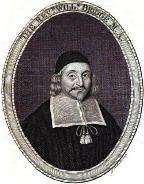William Bridge

William Bridge (c. 1600 – 1670) was a leading English Independent minister, preacher, and religious and political writer.
Life
A native of Cambridgeshire, the Rev. William Bridge was probably born in or around the year 1600. He studied at Emmanuel College, Cambridge, receiving an M.A. in 1626.[1][2]
For a short time in 1631, he was a lecturer (preacher) at Colchester, put in place by Harbottle Grimstone and Robert Rich, 2nd Earl of Warwick; this was very much against the wishes of William Laud, then Bishop of London, who complained of the influence then held by Richard Sibbes and William Gouge, clerical leaders of the Feoffees for Impropriations.[3][4] From 1637, he lived in Norwich as Rector of St Peter Hungate, Norwich and St George's Church, Tombland, Norwich.[5] He came into conflict with Matthew Wren, bishop of Norwich,[6] for Nonconformity. He went into exile[7] in Rotterdam, taking the position left vacant by Hugh Peters.[8] Charles I of England upon hearing from Archbishop Laud that Rev. Bridge had "gone to Holland", "...rather than [that] he will conform" replied, "Let him go: we are well rid of him."[9]
He returned to Great Yarmouth and became a member of the Westminster Assembly. There he was one of the Five Dissenting Brethren, the small group of leading churchmen who emerged at the head of the Independent faction, opposing the Presbyterian majority.
In 1643, he preached in front of Charles I of England, making a direct attack on the Queen.[10]
He was Minister at the Old Meeting House Norwich for several years right up until his death.
Works
- A Lifting Up for the Downcast, reprinted by the Banner of Truth Trust
- The Wounded Conscience Cured, the Weak One Strengthened and the Doubting Satisfied by Way of Answer to Doctor Ferne (1642)[11]
- Ioabs covnsell and King Davids seasonable hearing it (1643),[12] Fast Sermon for February 22
- The truth of the times vindicated (1643)[13]
- The righteous man's habitation in the time of plague and pestilence : being a brief exposition of the XCI. Psalm (1835)
- The refuge : containing the righteous man's habitation in the time of plague and pestilence : being a brief exposition of the 91st Psalm (1832)
- The works of the Rev. William Bridge (Volume 1)
- The works of the Rev. William Bridge (Volume 2)
- The works of the Rev. William Bridge (Volume 3)
- The works of the Rev. William Bridge (Volume 4)
- The works of the Rev. William Bridge (Volume 5)
A large collected Works of the Rev. William Bridge was published in 1845, and reprinted in 1989 in five hardback volumes by Soli Deo Gloria Publications.
References
- Peter King, Bishop Wren and the Suppression of the 'Norwich Lecturers', The Historical Journal, Vol. 11, No. 2 (1968), pp. 237–254
- Beeke, Joel R. and Pederson Randall J., Meet the Puritans (With a Guide to Modern Reprints), (Grand Rapids, Michigan, 2006)
- The works of William Bridge & Biography from A Puritan's Mind website
Notes
- ↑ "Bridge, William (BRG619W)". A Cambridge Alumni Database. University of Cambridge.
- ↑ Concise Dictionary of National Biography
- ↑ ; Hill, Society and Puritanism, p. 101
- ↑ Christopher Hill, Economic Problems of the Church (1968 reprint), p. 269.
- ↑ Norfolk Churches
- ↑ Ligonier Ministries |Meet The Puritans
- ↑ The English Home of Mr. Timothy Dalton, B. A. : Suspension - Flight - Resignation
- ↑ Hugh Trevor-Roper, Archbishop Laud (2000 edition), p. 257
- ↑ Beeke, Joel R. and Pederson Randall J., Meet the Puritans (With a Guide to Modern Reprints), (Grand Rapids, Michigan, 2006), p.93
- ↑ Hugh Trevor-Roper, PDF at p. 288, Religion, the Reformation and Social Change, p. 312
- ↑ The wovnded conscience cvred, the weak one strengthened and the doubting satisfied by way of answer to Doctor Fearne : where the maine point is rightly stated, and objections throughly answered, for the good of those who are willing not to be deceived [WorldCat.org]
- ↑ Ioabs covnsell and King Davids seasonable hearing it delivered in a sermon before the honourable House of Commons at their late solomne fast, Feb. 22 [WorldCat.org]
- ↑ The truth of the times vindicated whereby the lawfulnesse of Parliamentary proceedings in taking up of arms, is justified, Doctor Fernes reply answered, and the case in question more fully resolved [WorldCat.org]